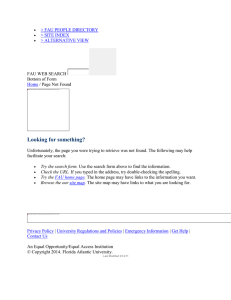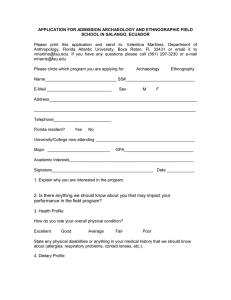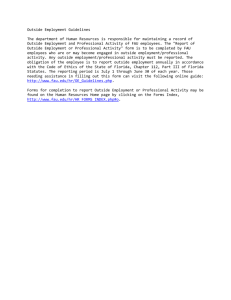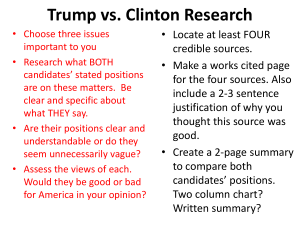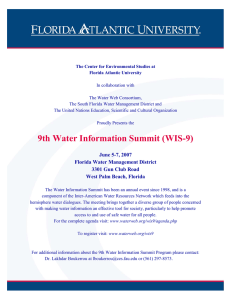Florida Atlantic University
advertisement
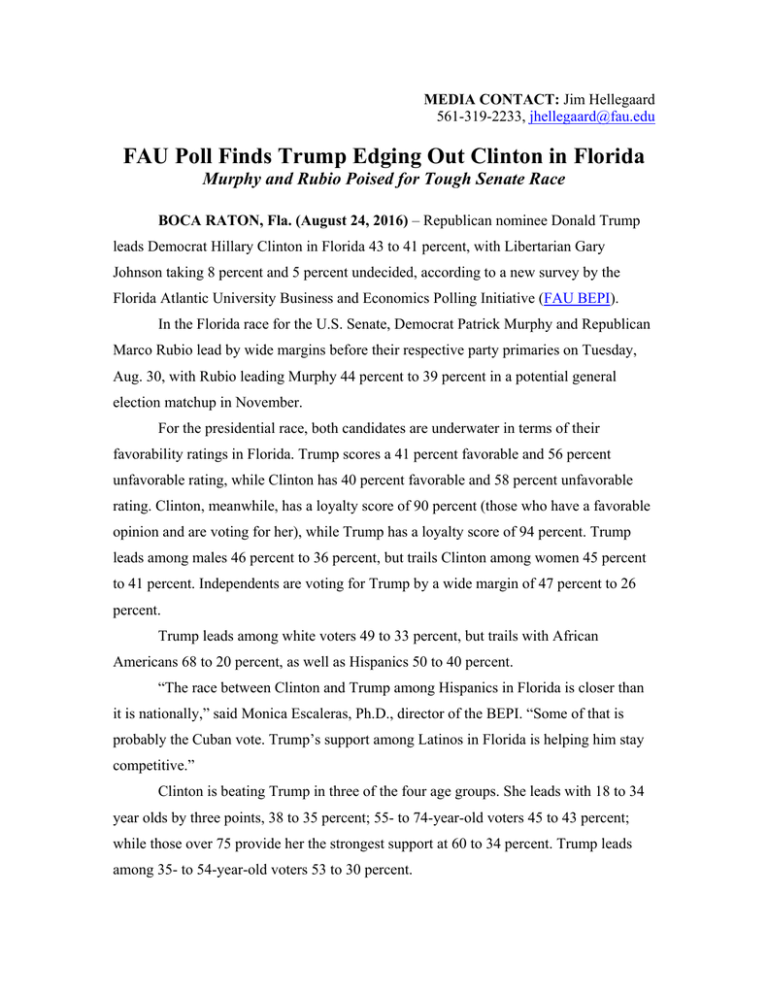
MEDIA CONTACT: Jim Hellegaard 561-319-2233, jhellegaard@fau.edu FAU Poll Finds Trump Edging Out Clinton in Florida Murphy and Rubio Poised for Tough Senate Race BOCA RATON, Fla. (August 24, 2016) – Republican nominee Donald Trump leads Democrat Hillary Clinton in Florida 43 to 41 percent, with Libertarian Gary Johnson taking 8 percent and 5 percent undecided, according to a new survey by the Florida Atlantic University Business and Economics Polling Initiative (FAU BEPI). In the Florida race for the U.S. Senate, Democrat Patrick Murphy and Republican Marco Rubio lead by wide margins before their respective party primaries on Tuesday, Aug. 30, with Rubio leading Murphy 44 percent to 39 percent in a potential general election matchup in November. For the presidential race, both candidates are underwater in terms of their favorability ratings in Florida. Trump scores a 41 percent favorable and 56 percent unfavorable rating, while Clinton has 40 percent favorable and 58 percent unfavorable rating. Clinton, meanwhile, has a loyalty score of 90 percent (those who have a favorable opinion and are voting for her), while Trump has a loyalty score of 94 percent. Trump leads among males 46 percent to 36 percent, but trails Clinton among women 45 percent to 41 percent. Independents are voting for Trump by a wide margin of 47 percent to 26 percent. Trump leads among white voters 49 to 33 percent, but trails with African Americans 68 to 20 percent, as well as Hispanics 50 to 40 percent. “The race between Clinton and Trump among Hispanics in Florida is closer than it is nationally,” said Monica Escaleras, Ph.D., director of the BEPI. “Some of that is probably the Cuban vote. Trump’s support among Latinos in Florida is helping him stay competitive.” Clinton is beating Trump in three of the four age groups. She leads with 18 to 34 year olds by three points, 38 to 35 percent; 55- to 74-year-old voters 45 to 43 percent; while those over 75 provide her the strongest support at 60 to 34 percent. Trump leads among 35- to 54-year-old voters 53 to 30 percent. Trump’s strongest regional support is in the western part of Florida where he leads 52 to 34 percent, and in the north at 47 to 32 percent. Trump also leads in the central region 44 to 36 percent. Clinton’s support is in South Florida, where she leads 57 to 30 percent. The top issue for voters was dissatisfaction with government at 29 percent, followed by jobs at 18 percent; immigration at 13 percent; and ISIS at 12 percent. The top quality for voters is experience at 27 percent; followed by Commander-in-Chief at 16 percent; trustworthiness at 15 percent; and focus on the economy at 14 percent. Wanting an outsider was mentioned by 12 percent of respondents. Kevin Wagner, Ph.D., associate professor of political science at FAU and a research fellow of the Initiative, said that despite the national trend, the presidential race in Florida remains close and is within the survey’s margin of error. “The fact that both Mr. Trump and Secretary Clinton are significantly upside down in their favorability ratings could make it difficult for either to move substantially ahead,” he said. “Clinton likely got a boost from the fact that Floridians chose experience as the top quality they are looking for in their presidential candidate. But, Floridians also chose dissatisfaction with government as their top issue, which likely favors Mr. Trump.” The Florida poll was conducted Aug. 19-22. The polling sample was a random selection of registered voters. The Democratic primary consisted of 364 registered Democrat likely primary voters with a margin of error of +/-5.1 percent at a 95 percent confidence level. The Republican primary consisted of 327 registered Republican likely primary voters with a margin of error of +/-5.4 percent at a 95 percent confidence level. The General election poll consisted of 1,200 registered likely voters with a margin of error of +/-2.7 percent at a 95 percent confidence level. For more information, contact Monica Escaleras, Ph.D., at 561-297-1312 or BEPI@fau.edu, or visit www.business.fau.edu/bepi. - FAU About FAU BEPI: The Florida Atlantic University Business and Economic Polling Initiative conducts surveys on business, economic, political and social issues with a focus on Hispanic attitudes and opinions at regional, state and national levels via planned monthly national surveys. The initiative subscribes to the American Association of Public Opinion Research and is a resource for public and private organizations, academic research and media outlets. In addition, the initiative is designed to contribute to the educational mission of the University by providing students with valuable opportunities to enhance their educational experience by designing and carrying out public opinion research. About Florida Atlantic University Florida Atlantic University, established in 1961, officially opened its doors in 1964 as the fifth public university in Florida. Today, the University, with an annual economic impact of $6.3 billion, serves more than 30,000 undergraduate and graduate students at sites throughout its six-county service region in southeast Florida. FAU’s world-class teaching and research faculty serves students through 10 colleges: the Dorothy F. Schmidt College of Arts and Letters, the College of Business, the College for Design and Social Inquiry, the College of Education, the College of Engineering and Computer Science, the Graduate College, the Harriet L. Wilkes Honors College, the Charles E. Schmidt College of Medicine, the Christine E. Lynn College of Nursing and the Charles E. Schmidt College of Science. FAU is ranked as a High Research Activity institution by the Carnegie Foundation for the Advancement of Teaching. The University is placing special focus on the rapid development of critical areas that form the basis of its strategic plan: Healthy aging, biotech, coastal and marine issues, neuroscience, regenerative medicine, informatics, lifespan and the environment. These areas provide opportunities for faculty and students to build upon FAU’s existing strengths in research and scholarship. For more information, visit www.fau.edu.
